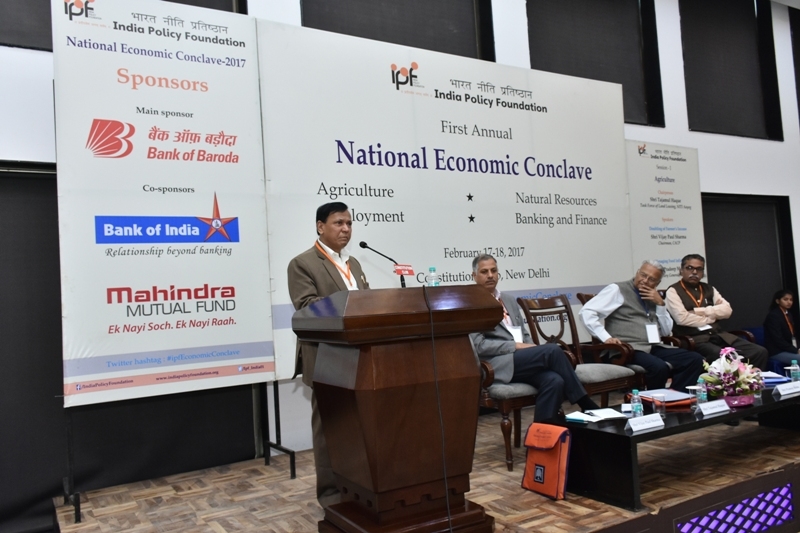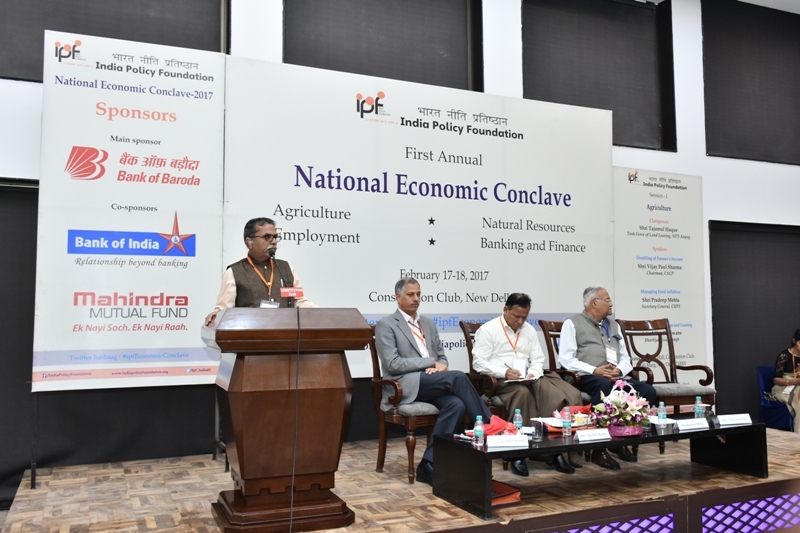National Economic Conclave 17-18 February, 2017
Total Views |
February 17-18, 2017, Constitution Club of India, New Delhi
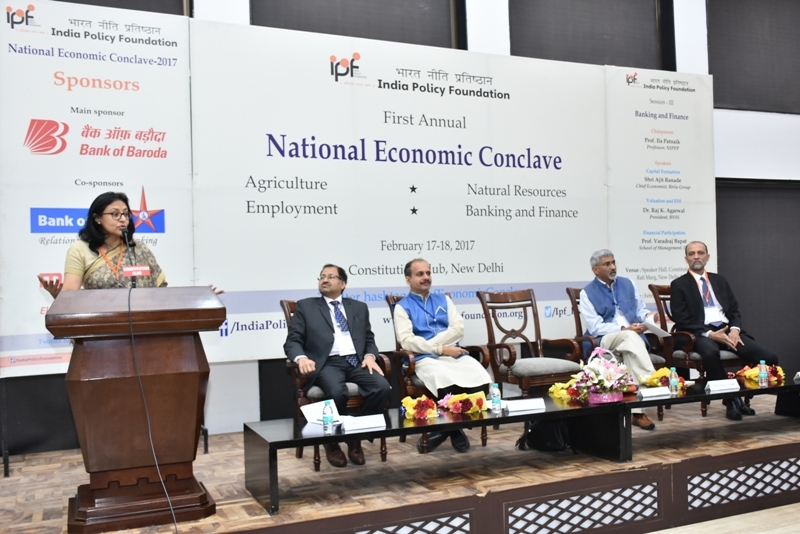
India is growing through its governance and policies and Indian economic and social developments are shaping up on the global variables, we should not leave the cultural and social values in our development agenda, said by RSS Sah Sarkaryavah Dattatreya Hosabole . Giving the inaugural address of the first National Economic Conclave organised by India Policy Foundation, a think tank which is known for its contribution on issues of national and international importance, he opined that Agriculture, Consumption and Natural resources areas should not be taken only as economic equations but also in the social and national context which are integral of the ecosystem, so let’s not follow economic models of the developed nations blindly. Sh Dattatreya said that we are a nation in villages and developing and ensuring opportunities for farmers is first need of the government.
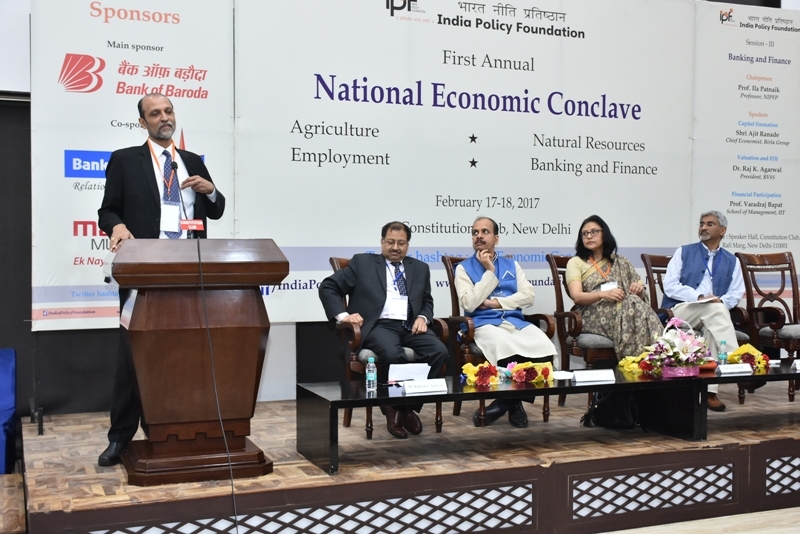
Sh Dattatreya Hosabole , Prof. Rakesh Sinha, Prof. Kapil Kapoor, Sh Gopal Agarwal in inaugural session of the first National Economic Conclave 2017.
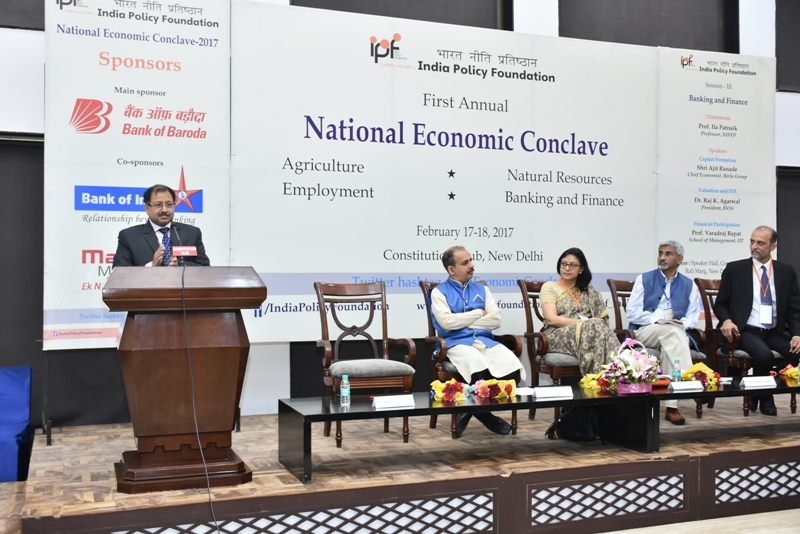
In his speech by Prof Rakesh Sinha, Hon Director of IPF, he said ‘India has survived on its internal strengths of long past and it survived many social and economic wars due to non-compartmentalized approach. The neoliberal approach is being revisited and capitalist model of economic development is being revisited, nations are working on reviewing their development models and objecting concentration of wealth over creation and equitable distribution of wealth. He added that ‘ The value of life and security of life is more than one policy or model, we must ensure basic constitutional rights to all citizens and should not negotiate it with productivity only’, he added, some of the issues need to be disconnected with politics.
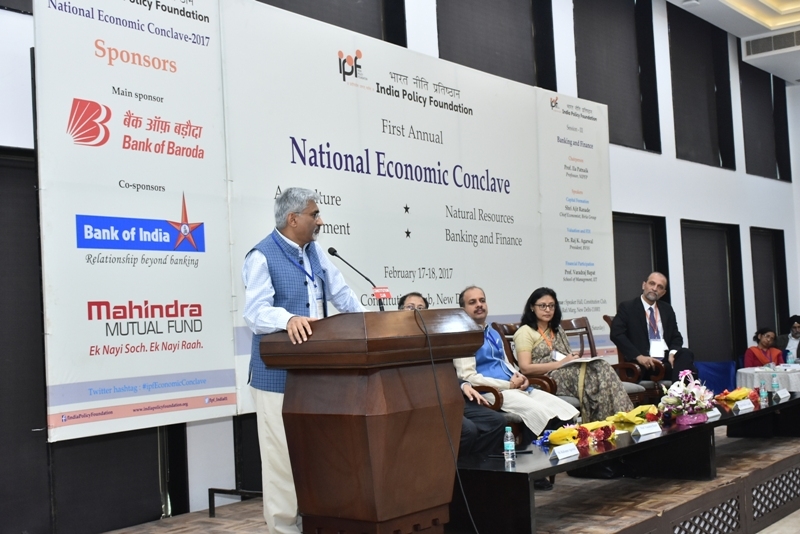
Presenting the theme of the conclave, Sh Gopal Krishna Agarwal, Conclave convener and BJP Economic Cell convener said that we aim to approach a discussion on Sustainable Development which has major issues in the domain of managing natural resources, allocation and market forces, water availability, managing food security, skill development and employment creation, labour law reforms, capital formation, banking and finance, and other aligned areas. He mentioned that we need to come together and dialogue for a review, find more valuable inputs in direction and policies, and have a way forwarded with more holistic approach and model, and with engaging all stakeholders in equitable and just manner. Sh Gopal Agarwal also added that ‘India has abundant natural resources, high degree of entrepreneurship and proud intellectual capital, we have to address to a large population and we can come up with our own indigenous understanding engaging in all stakeholder and create a positive dialogue’, we have this conclave addressing concerns and inviting views for higher purpose of development.
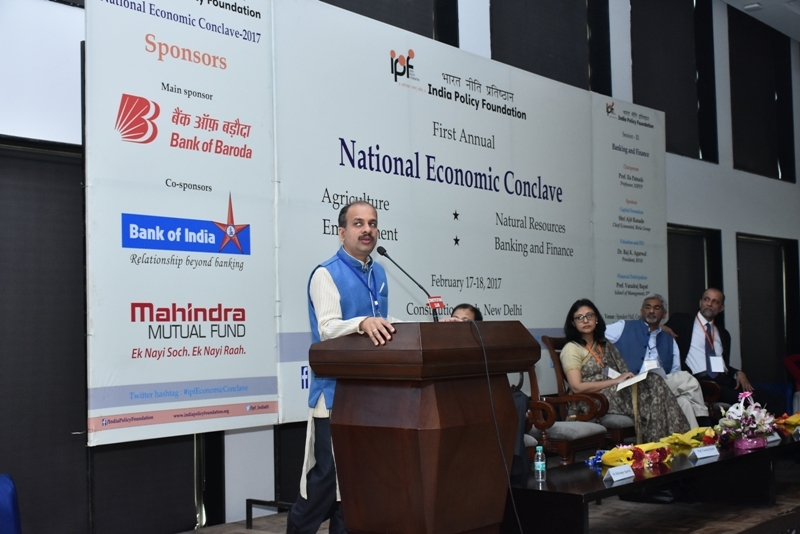
The first edition of National Economic Conclave in 2017 opened in an open space to understand how has governments, in past , performed on development issues, how is economic development addressed and how is it progressing. The conclave is addressing the complexities of the development with economic forces bring one of the main forces. The agenda included Agriculture, Natural Resources, Banking and Finance, and Employment.
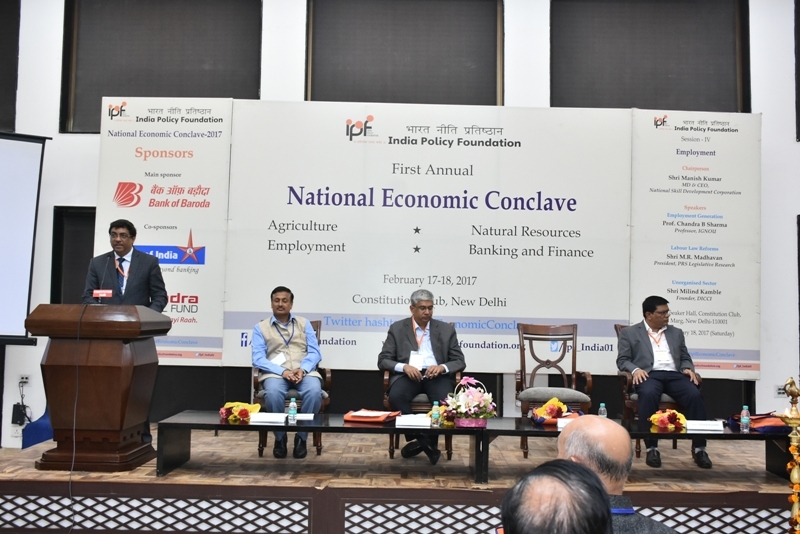
The first session on Agriculture which had speakers Sh Tajamul Haque, Task Force of Land Leasing, NITI Aayog; Sh Vijay Paul Sharma, Chairman, CACP; Sh Pradeep Mehta, Secretary General CUTS; Sh Vilas Sonawane, Bharat Krishak Samaj, who discussed on issues of doubling of farmers income, managing food inflation, land reform- digitization and leasing. Panel finds that we have sufficient agri -production but storage, quality, and market linkages are big issues which need higher degree of institutional and private participation. It’s not about managing food inflation but keeping food inflation in limits, and land reforms are must for participation of large population and reversing the city migration. It also concluded that food inflation is good for traders and not for farmers, so liberal policies not necessarily help and be effective for faremrs , we have to make it more integrated for being effective and efficient. India needs Rights of Tenancy, review of Land Reforms, and the institutional mechanism of the land utilization and digitilisation need to be efficient and the present system is not ready for expected delivery. The session also made strong views on institutional bottlenecks in the system, if we want to increase income of the farmers we must address infrastructure, institutions, policy, technology and pricing in an integrated manner. Market linkage is must to provide farmers a direct access and cut many layers of middlemen.
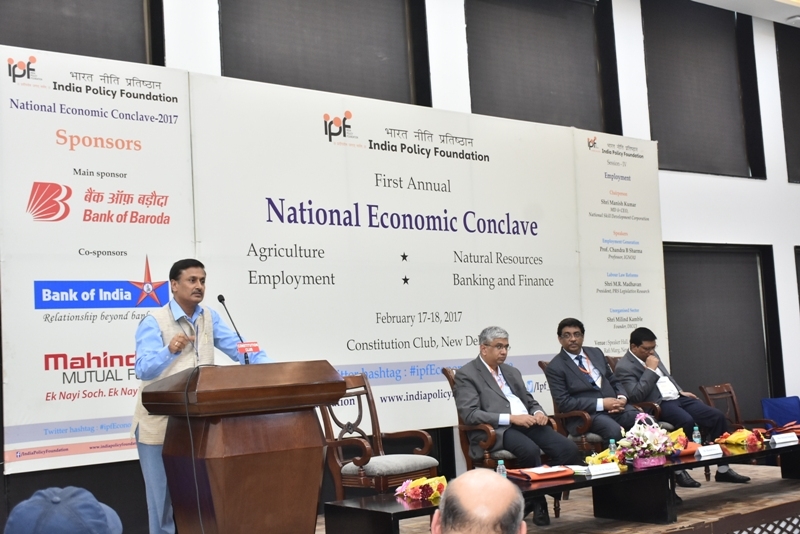
A sensitive issue like Natural Resources, with panel of Prof. Bharat Jhunjhunwala, former Professor of Economics at IIM Bangalore said that we are following the westerns models with complete faith and not addressing the real and Indian issues properly. We must appreciate that Indian societies can take care of the natural resources and not the governments necessarily. Dr Ram Singh, Professor at Delhi School of Economics; and Dr Jyoti Shukla, Chairperson, Rajasthan State Finance Commission; and Sh Deedar Singh, social activist on water issues made inroads to more stable approach towards managing natural resources i.e. making society and community as Trustee of the resources. Sh Ashok Bhagat, Social Worker & Secretary Vikas Bharti presented the realities of the tribals who took utmost care in keeping the natural resources but government came as a conflict. He said that we need to trust people of India and make them partner in development, government machinery can not make it. Sh Deedar Singh also made similar statement in case of his views on water in NCR and nearby regions, where he protected large lands from the industrial lobbyist and sometimes lost against them due to political intervention for helping industry and not farmers. He said, court made a penalty of INR 1,00,000 against a business model of INR 25,000 crores; this cannot be said to be a justice.
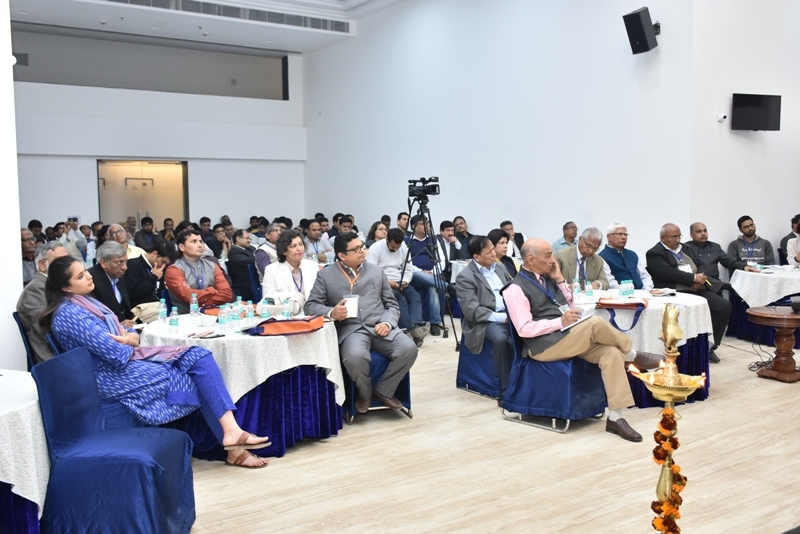
Speaking in the Conclave, Sh Suresh Prabhu, Minister of Railways said that Development needs a review, and sustainable development cannot work without social aspects. He added, agriculture growth should be linked with forest, farm, and water; and other economic models directly cannot be a fit to Indian context. Sh Prabhu said that we have examples of dealing with environment and waste in an integrated manner with the economic progress and social values, we don’t need to compartmentalize and then integrate them.
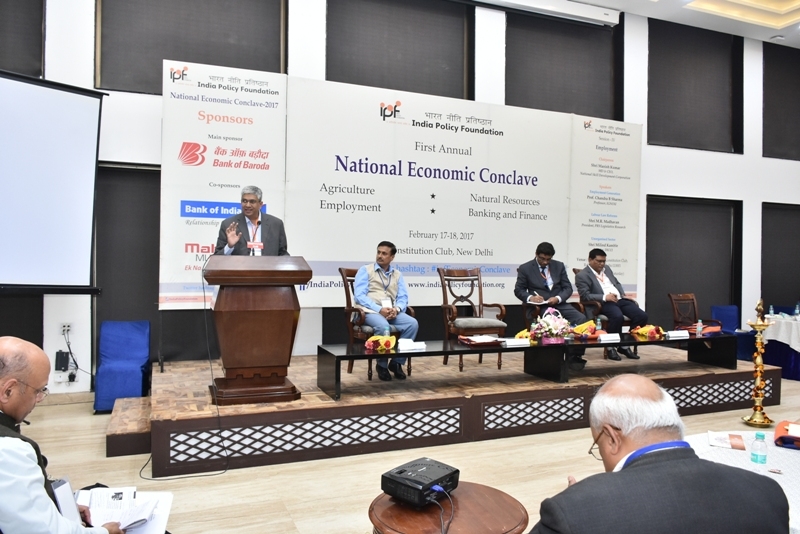
Addressing the ‘Employment’ session, Sh Manish Kumar, MD NSDC, stressed on the attention of government to build skills in the younger generation. He also said that states are realizing the issues with same seriousness and we are creating a strong network of institutions for recongnising , developing and certifying skills. Government has made huge expenditures in making infrastructure for schools and developing education but could not transfer knowledge either for living or for skill, said Dr Chandra B Sharma, NIOS head. He also said that we are moving towards a society which will become another explosive society like population explosion if we do not address the needs of knowledge and skill appropriately. Sh Milind Kamble, Founder Dalit Chamber of Commerce, also addressed the issue of skill, connection of industry and academia and motivating the culture of work and employment in unorganized sector as it is most accommodating in terms of size and presents dignity to a large population immediately. Sh M R Madhavan , PRS Legislative Research Founder, said that we are living in the era of British when it comes to Laws, we have to review them and reduce them. The numbers and content of the Laws we inherit are complex and we cannot move in positive manner if we remain with same Acts, Labour Laws need same.
Session on ‘Banking and Finance’, chaired by Dr Ila Patnaik, Professor NIPFP presented her views on the basic conflict of controls and institutional freedom, she said that we should allow the institutions to work in free environment. Speaking in the conclave Dr Ajit Ranade, chief economist Birla Group, said that India needs to define and create various channels of Capital Formation, discussing the capital formation of the economies US researches indicated that about 70 percent of it comes from human capital, which we usually tend to ignore in our economic calculations, in a wild guess it could be close to 20 percent only in India. He also said that Chinese economy is investment based and we must learn from good practices from around the world in handling few issues. Prof. Vardraj Bapat, IIT Mumbai presented views on Financial Inclusion and argued for SHG models although not ignoring the various other models. He also stressed on the issues of governance and financial support to the unprivileged through both banking and non-banking routes. Sh Rajkumar Agarwal, President BVSS presented his views on Valuation and Foreign Direct Investment and its impact in the economy and said that we have right institutions and policies to support it and build for a better economy.
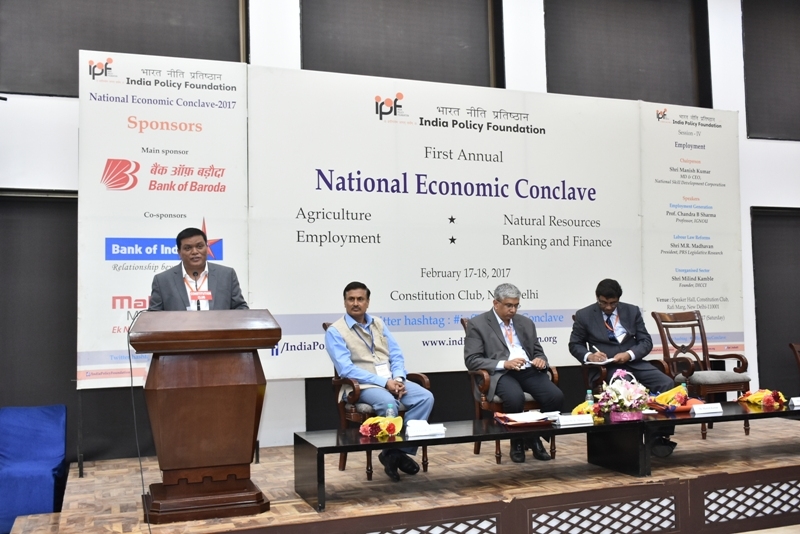
Prof. Kapil Kapoor, Former Pro Vice Chancellor JNU, in his speech, said that focus of India should be agriculture based Rural Economic Policy and only service based Industrial Policy, both are must but first addressed 60 percent population. He added that western models are good in their context but not in Indian, community models are dying – haats , community farmers melas , Pachisee / Pichasee village concept of farming, selling and social nurturing is lost which is the only way of sustainable development. Prof. Kapoor said that why cannot we have Agriculture Zone in this country if we want to pursue and be focused for largest population of this nation, we cannot negotiate wealth creation with green revolution that we conceptualized making our society sick and soil cancerous.
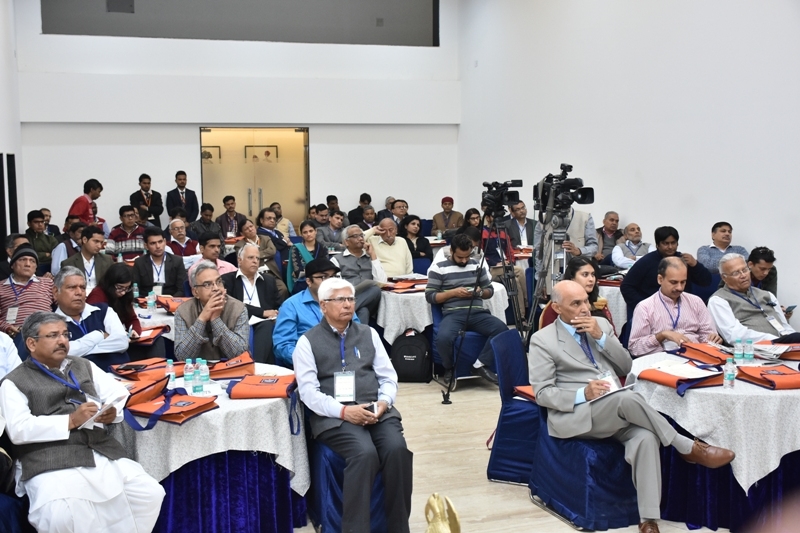
Prof. Rakesh Sinha, Hon Director IPF said that we enter in a national narrative for economic and social development which is beyond politics. IPF has always pursued intellectual debates with highest integrity in the context as set by speakers who are never distorted for any short term benefit.
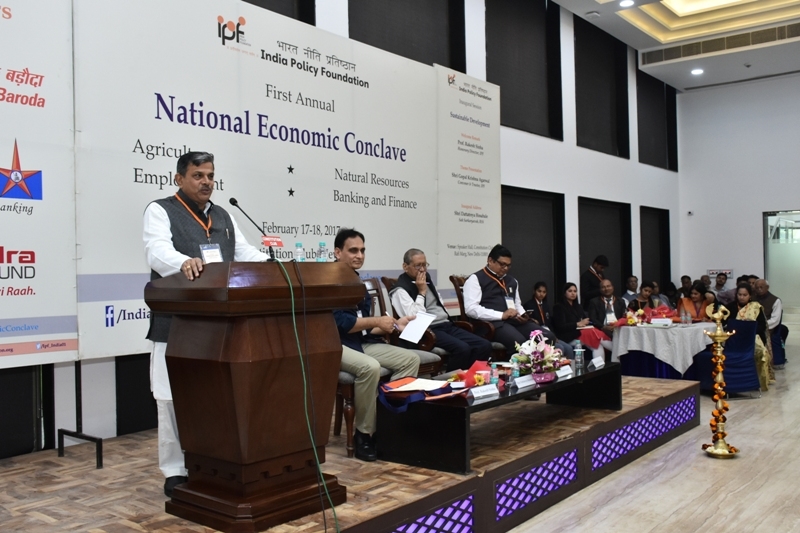
Sh Gopal Agarwal, Conclave convener, presented the report of the conclave in its facts and spirit and thanked the speakers and participants for their active participation. He concluded that ease of leasing mechanism is must , integration of price realized by farmers and paid by consumers, managing inflation as it benefits the middlemen only, the doubling of farmers’ real income should be linked with a base year. He added that natural resources are best protected in hands of the community and government should support this in policies. He said that issues were flagged in the most relevant manner and all speakers have presented evidences of their statements. Sh Agarwal also recognized the contributions and support of all institutions associated with the Conclave.
